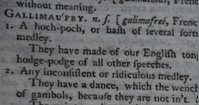Shipping and subrogation
 By means of the doctrine of subrogation, one person is substituted for another in the exercise of that other’s rights against a third person. In particular, it is the process by which one party is substituted for another so that the first party may enforce that other’s rights against a third party. In the classic triangular fact pattern, it arises where a creditor has rights against a debtor, the third party pays the creditor, and is then subrogated to the rights of the creditor against the debtor. In Bell Lines v Waterford Multiport Ltd [2006] IEHC 188 (28 April 2006) rvsd [2010] IESC 15 (18 March 2010), unemployment agencies in the UK paid various entitlements to UK-based employees of an Irish company in liquidation, and successfully sought to be subrogated to those employees’ preferential claims against the company in the Irish liquidation.
By means of the doctrine of subrogation, one person is substituted for another in the exercise of that other’s rights against a third person. In particular, it is the process by which one party is substituted for another so that the first party may enforce that other’s rights against a third party. In the classic triangular fact pattern, it arises where a creditor has rights against a debtor, the third party pays the creditor, and is then subrogated to the rights of the creditor against the debtor. In Bell Lines v Waterford Multiport Ltd [2006] IEHC 188 (28 April 2006) rvsd [2010] IESC 15 (18 March 2010), unemployment agencies in the UK paid various entitlements to UK-based employees of an Irish company in liquidation, and successfully sought to be subrogated to those employees’ preferential claims against the company in the Irish liquidation.
The litigation raises, but does not answer, some rather profound questions about the nature of subrogation. In Banque Financière de la Cité v Parc (Battersea) Ltd [1999] 1 AC 221, [1998] UKHL 7 (26 February 1998) and Bofinger v Kingsway (2009) 239 CLR 269, [2009] HCA 44 (13 October 2009), the House of Lords and the High Court of Australia took different approaches to the relationship of unjust enrichment and subrogation (see my previous posts).…




 I wrote
I wrote  On 19 May 1760,
On 19 May 1760,